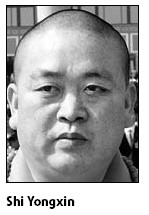Shaolin strikes back at online hacker attacks
The abbot of Shaolin Temple, which is famous worldwide for its kungfu prowess, defended his monastery Monday amid cyber-attacks and a new round of accusations over its growing commercialization.
"We all know Shaolin has kungfu," said Shi Yongxin in an interview broadcast online with a website affiliated with the People's Daily.
"Now there is kungfu on the Internet," said Shi, referring to an earlier cyber-attack on Shaolin's website.
|
|
Shi, 44, is also deputy director of the Buddhist Association of China.
At first, Shi thought the people behind the attacks were just curious about the temple's website. But after reading the letter, he believed they were making jokes about the temple, about Buddhism and about himself.
Shi stopped short of commenting on the letter's contents.
The website, shaolin.org.cn, has been closed since administrators of the site noticed the attacks on Nov 11.
But Shi said the attacks were a warning to the temple as well as to him and they will make efforts to improve themselves.
"We've not considered suing the perpetrator yet," he said.
"As monks, we should focus only on our Buddhist disciplines. We are not excited about filing lawsuits."
Despite Shaolin's reputation in the country for its money-making ability, Shi dismissed claims that the temple is the first Buddhist monastery to charge visitors entrance fees.
"I have called many times for the abolishment of entrance fees in recent years," Shi said.
He suggested that no tickets be required for entry to all temples across China.
Still, life at the Shaolin temple is also witnessing a rise in food prices.
Costs for food for a monk at the temple is now 7 yuan a day compared with 5 yuan a day three years ago, Shi said.
At the temple, the monks' daily diet of three meals consists of steamed buns, noodles and rice. All Buddhists are vegetarians.
Shi said he also follows these disciplines.
In the interview, Shi made a rare disclosure about his income as the head of the temple, saying he is not an exception as far as the so-called "danjin", or salary, is concerned.
"The monthly danjin is between 100 yuan and 200 yuan, including mine," he said.
Some monks can earn a monthly income of up to 1,000 yuan because they are supported by secular Buddhist believers. Compared with local living standards, this is a good income, Shi said.
Monks usually spend the money on stationery and materials for daily and religious use, he said.
 0 Comments
0 Comments







